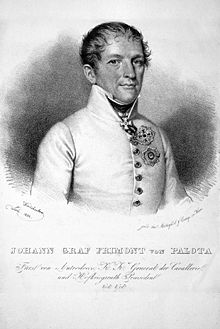Johann Maria Philipp Frimont of Palota
Johann Maria Philipp Frimont, Count of Palota , Prince of Antrodoco; (Born February 3, 1759 in Finstingen , Lorraine ; † December 26, 1831 in Vienna ), was an Austrian cavalry general.
Life

He was the son of Dominique de Frimont (died 1766) and his wife Jeanne Marguerite Horiot de Collancy. After receiving his training at the Collegium in Pont-à-Mousson, Frimont joined the Austrian Hussar Regiment Count Wurmser as a common soldier in 1776 . He was made an officer (lieutenant) in the War of the Bavarian Succession and then took part in the war against the Turks . On January 1, 1787, he was promoted to first lieutenant . In 1789 he was promoted to Rittmeister during the war in the Balkans and in March 1796 to major in the Croatian-Slavonian border hussars.
In the years 1792 to 1800 he distinguished himself several times in the first coalition wars, especially near Aldenhofen and near Mannheim . In 1796, still as a cavalry master, he acquired the Theresienkreuz (Knight's Cross of the Military Maria Theresa Order ) from Frankenthal . In 1797 he fought with the troops on the Rhine and rose to lieutenant colonel on April 29, 1797 . On April 25, 1798, Frimont was appointed colonel and commander of the newly established regiment of hunters on horseback, Count Bussy .
In the campaign of 1800 he proved himself as a cavalry leader at Marengo (July 14th) and was appointed major general on January 9th, 1801 . In the war of 1805 he served again in Italy. His personal bravery at the Battle of Caldiero earned him an honorable mention from Archduke Charles . As a result, Frimont was awarded the 9th Hussar Regiment and he was promoted to Lieutenant Field Marshal . In spring 1809 he took part in the campaigns in Friuli under Archduke Johann . For his circumspection and courage in the battle of Fontana Fredda (April 16, 1809), he was awarded the Commander's Cross of the Order of Maria Theresa .
In the campaign of 1812 he led a cavalry division in Schwarzenberg's corps in Russia . In Volyn penetrating he took in August at the Battle of Goroteschno part. In 1813 he was appointed general of the cavalry and commander of the corps, which - combined with the Bavarian corps Wrede - formed the 5th Army Corps of the large allied army. With this corps he played an essential part in the victories of Brienne , La Rothiere and Arcis-sur-Aube .
After the first Peace of Paris he became governor of Mainz and in 1815 commander in chief of the Austrian army in Italy, with which he first defeated Murat , then advanced to France, defeated Suchet and took Grenoble by storm, whereupon Lyon surrendered on July 11th. Frimont was now in command of the Austrian observation army remaining in France, with whom he stayed in France for a few years. In 1819 he was appointed commanding general in Veneto .
During the uprising in southern Italy in 1821, he became the commander-in-chief of the army destined to suppress the neapolitan unrest. On March 24, 1821 he entered Naples victoriously , for which King Ferdinand of Naples raised him to Prince of Antrodoco and gave him 220,000 ducats. In 1825 he became commander of the two unified generalates of Lombardy-Veneto , suppressed the rebellion that broke out in Modena in 1831 and became president of the Court War Council in the same year . Since his health was badly damaged by the long war years, he died soon after his arrival in Vienna.
For his services, General Frimont was appointed baron by the emperor (1808) and later count (1828) of Palota in the Bihar county on the outskirts of Transylvania and received the associated fief with six villages as a donation. He had several buildings built in Palota, including a school and a church (the foundation stone was laid on November 9, 1829), in the crypt of which his grave is still to this day.
literature
- Wilhelm Edler von Janko : Frimont, Johann Maria, Count of Palota . In: Allgemeine Deutsche Biographie (ADB). Volume 8, Duncker & Humblot, Leipzig 1878, p. 90 f.
- Frimont, Johann Maria Graf von, Prince of Antrodocco , in Constant von Wurzbach , Biographisches Lexikon des Kaiserthums Oesterreich , Volume 4, Vienna 1858.
- Frimont by Palota Johann Maria Graf. In: Austrian Biographical Lexicon 1815–1950 (ÖBL). Volume 1, Publishing House of the Austrian Academy of Sciences, Vienna 1957, p. 368 f. (Direct links on p. 368 , p. 369 ).
Individual evidence
| predecessor | Office | successor |
|---|---|---|
| Ignácz Gyulay |
President of the Court War Council 1831 |
Ignaz zu Hardegg |
| personal data | |
|---|---|
| SURNAME | Frimont from Palota, Johann Maria Philipp |
| ALTERNATIVE NAMES | Johann Maria Philipp Frimont, Count of Palota |
| BRIEF DESCRIPTION | Austrian cavalry general |
| DATE OF BIRTH | February 3, 1759 |
| PLACE OF BIRTH | Finstringen , Lorraine |
| DATE OF DEATH | December 26, 1831 |
| Place of death | Vienna |